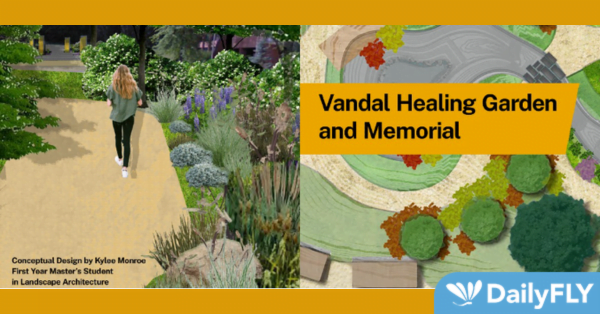It didn’t take long for architecture student Ryan Lorensen to fully comprehend the significance of his project. After absorbing the raw and sometimes intense feedback he was getting from people, he understood this was not just another undertaking.
“Hearing their vulnerability and emotion really opened my eyes to how important this memorial is,” said the senior from Kuna.
Lorensen, 11 of his architecture teammates and seven landscape architecture students recently completed designs for the Vandal Healing Garden and Memorial, a space to memorialize Vandals who died while attending U of I.
Although the four students who were killed at the King Road house in Moscow in November 2022 may be the most recognized members of this group, the memorial will represent all former students who passed away while enrolled in school.
“This is an incredibly important project not only to me personally, but also to the institution,” said Dean of Students Blaine Eckles.
Twelve U of I architecture students and seven landscape architecture students recently teamed up to create designs for the future Vandal Healing Garden and Memorial.
Property of University of Idaho
“I told the students as they started the semester they had the heart of the university in their hands, so treat it carefully. They have done so.”
Straight From the Source
Knowing many groups of people wanted to provide input about what the finished product should look like, the College of Art and Architecture (CAA) invited representatives from U of I and the city of Moscow to a charette — a collaborative and interactive workshop — last September.
Designed and administered by the students, the charette gave attendees the chance to sit in on several hands-on sessions, including designing their own memorial and stating preferences about potential building sites on campus.
“The charette really helped shape everything,” said Scott Lawrence, associate professor of architecture and one of the class instructors. “From the location to ideas about how people can interact and share, it really helped us focus on what was important to people.”
Some charette attendees showed their support by representing others who were still struggling with the King Road homicides and did not want to attend in-person.
“There were members of Greek houses there who were speaking for friends who couldn’t deal with being at the charette,” Lorensen said. “People are still healing but their voices should be heard.”
Additionally, the team also spent time with family members of various students who will be memorialized. Team members were not only able to internalize the importance of the memorial for those families but also discovered more about the students themselves, which they hope to show in their designs.
“We were able to get a lot of great information about who they were so we could try and capture their essence,” senior architecture student Madailein McLenna said. “We know this memorial won’t make everybody happy. But for some people, it’s going to mean everything.”
Next Steps
In December, the team presented two designs for the memorial to CAA and university representatives. Each plan is for a different section of MacLean Field, an area between the College of Education, Health and Human Sciences building, the physical education building and the Shattuck Arboretum.
A charette attendee uses cutouts to build their ideal memorial.
Property of University of Idaho
The MacLean Field site is favored because of its large size and central location on campus. The two designs focus on the memorial being an interactive space that can be shared by groups of people, while also featuring areas for individual reflection.
“Our voice needs to be reflective of things that we’ve heard from the community,” Lawrence said. “Getting their feedback gave us a better understanding of what role this memorial will play and how many different ways people want to use it.”
A big part of creating a space that sets the right tone was the landscaping portion of the project. According to Emily Stuart, she and her landscape architecture teammates focused on intertwining their expertise with the concepts created by the architecture students.
“We focused on the senses we use while experiencing a garden, especially one meant to aid with the healing process,” said Stuart, a senior from Idaho Falls. “We all knew we needed a timeless space that captured Vandal energy, meaning our designs needed to be humble, natural and inviting.”
A conceptual design of the future Vandal Healing Garden and Memorial.
Property of University of Idaho
With the submission of the two concepts, the students will continue fine-tuning their designs during the Spring 2024 semester. The goal is to have one design submitted to U of I for approval later this summer. Once approved, construction could start once fundraising meets estimated project costs.
McLenna, originally from Boise, is hoping to be involved in the construction phase of the project. But even if she isn’t, she is happy about what she and the team achieved.
“There’s something really exciting about getting to this point,” she said. “Someday we’re going to be able to look at the memorial and say, ‘We did that’.”
